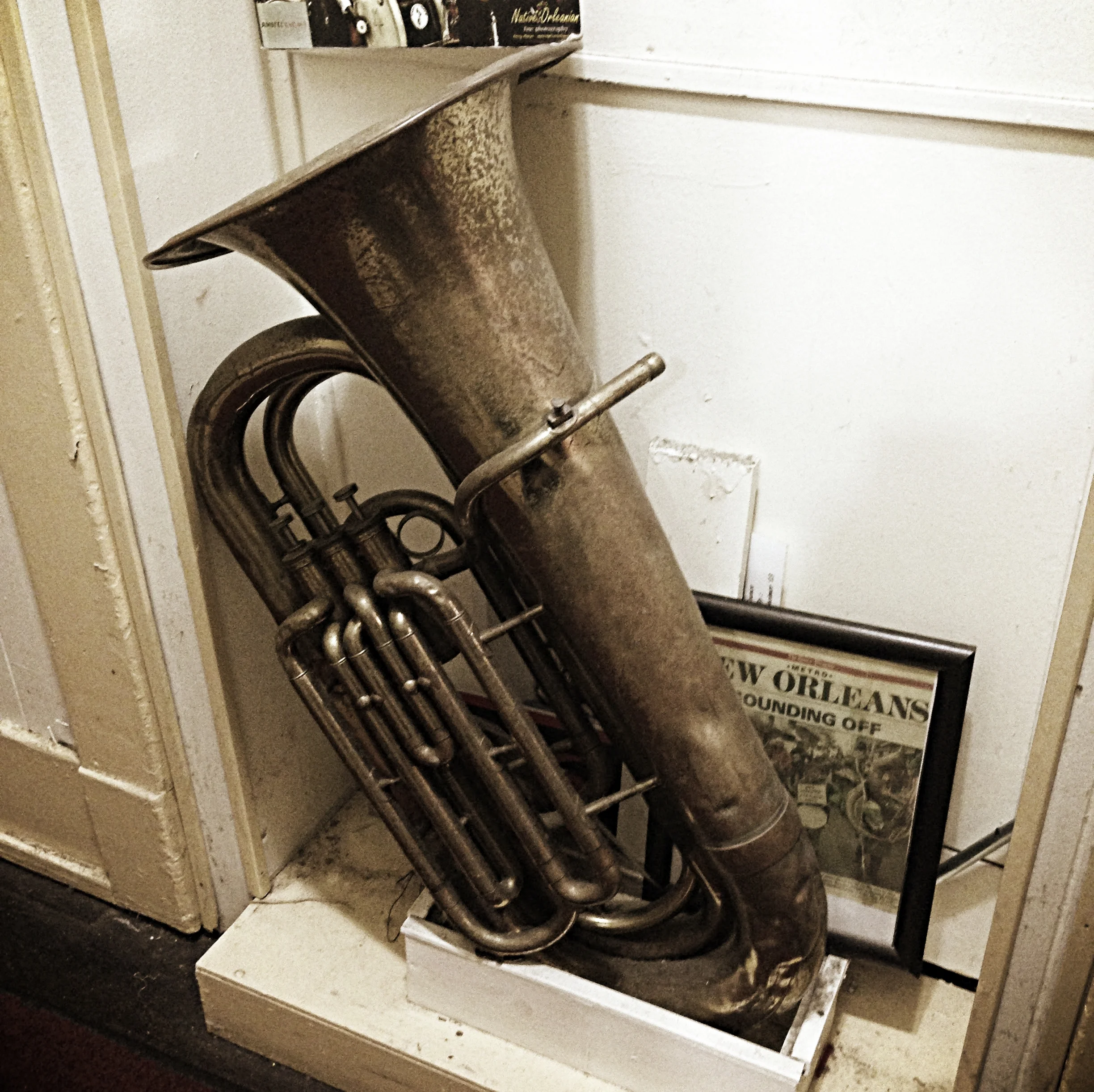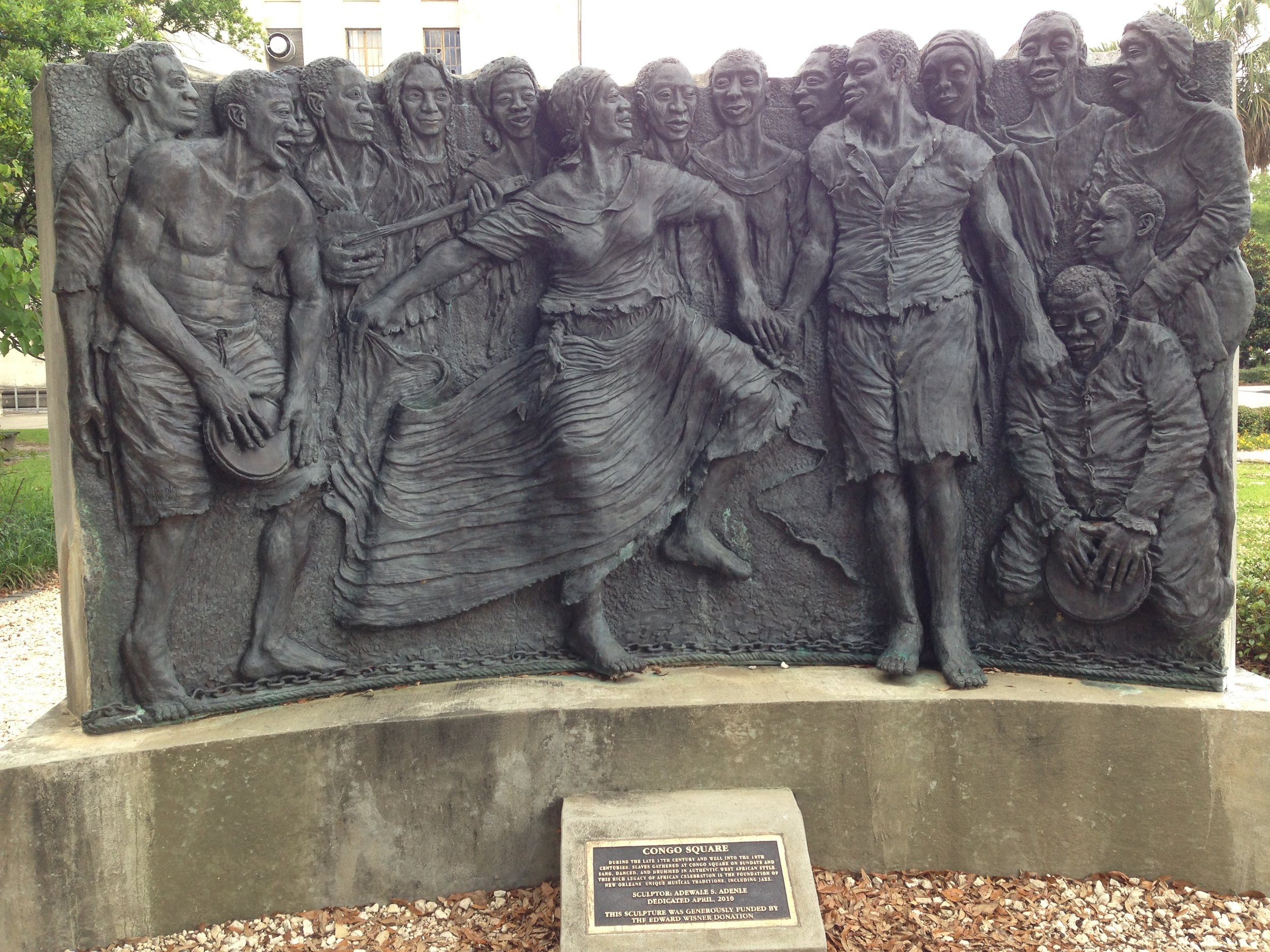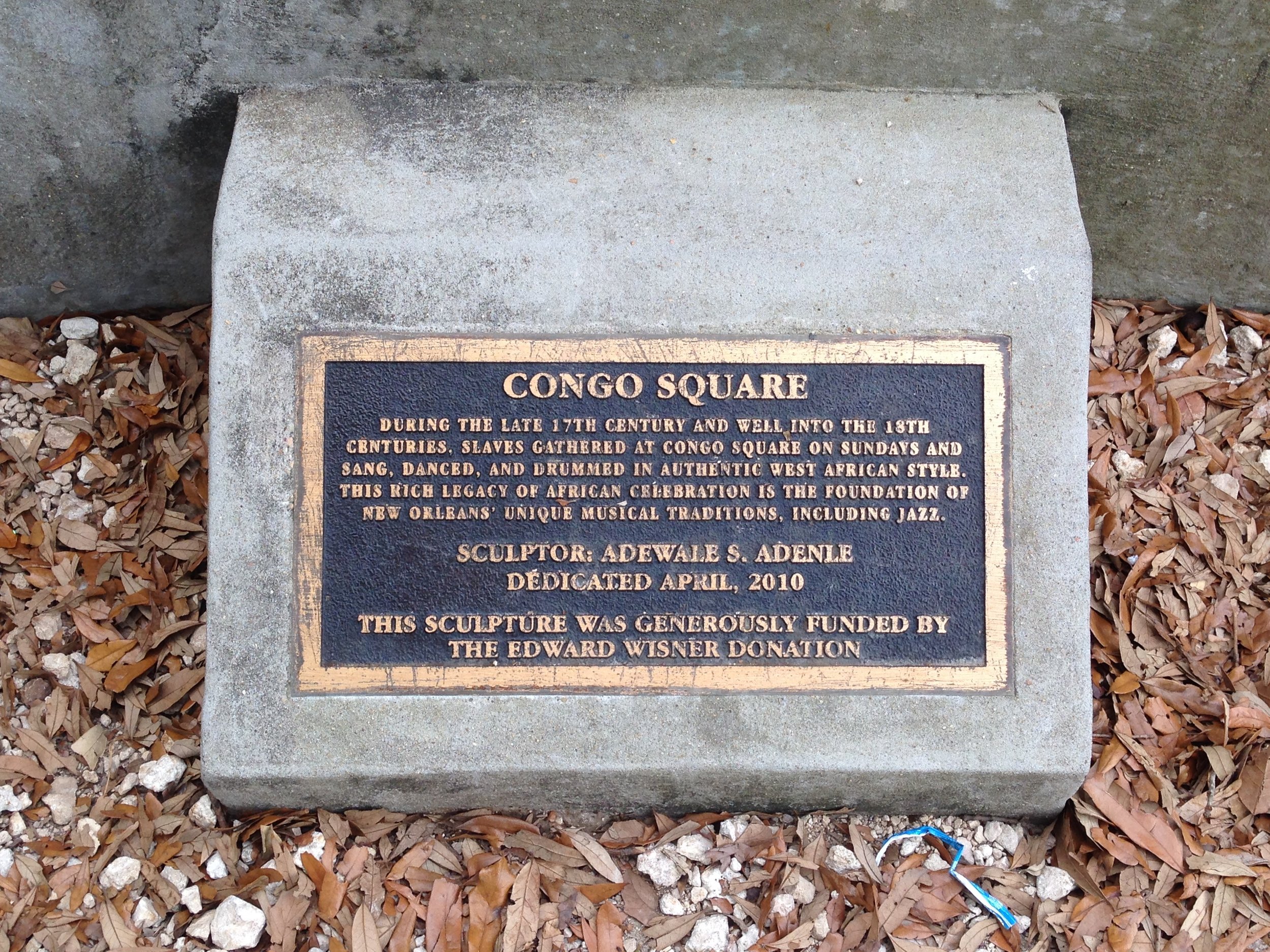“‘... The only thing that keeps him from thinking he is not a hog is that radio. Take that radio away, and let’s see what you can do for the soul of a hog.’”
New Orleans: the birthplace of jazz.
Knowing the title this city held, we could only expect our journey through Southern Louisiana to take us through magical musical territories. However, it has actually been more than I expected. Not only is the jazz, the bluegrass, the Cajun music, the street drumming, and everything else practically ubiquitous here—take a late night stroll through the French Quarter and you’ll hear different genres of music coming at you from all directions—but music has taken a larger role in the trip’s significance for me and in the texts that we’ve read.
Upon arriving in Grand Isle, our main source of music was the sea, which greeted us with beautiful melodies, consistent crashing of waves—upon one another and against rocks. I was happy to read about the allure and the musicality of the sea in Kate Chopin’s The Awakening. Yet, Chopin surprised me by also making literal music—or a less metaphorical music, I should say—a vital element to Edna’s story.
In the first half of the story, Robert asks Mademoiselle Reisz if she would play the piano for Edna, seemingly knowing Edna’s fondness for her talent. Now, Chopin writes that Edna was “very fond of music” and “musical strains, well rendered, had a way of evoking pictures in her mind.” Yet, Mademoiselle Reisz’s piano playing evoke no pictures for her. Instead, “the passions themselves were aroused within her soul...” She believes it makes her feel this way because it was the first time she was “ready” for the music, ready for the experience.
“She saw no pictures of solitude, of hope, of longing, or of despair. But the very passions themselves were aroused within her soul, swaying it, lashing it, as the waves daily beat upon her splendid body. She trembled, she was choking, and the tears blinded her.”
I thought this was strange since I would expect an unexpected bombardment of beautiful music to affect someone most deeply. However, as we headed into New Orleans, to many venues where we obviously expected great music to be played, Edna’s sensation began to feel more real for me. Although it wasn’t solely piano music that captivated us in New Orleans, it’s difficult to ignore the similarity between the intimacy of her experience and the intimacy I have experienced here, sitting or standing among a crowd of people but knowing that my reaction, my perception of the music is different from everyone else’s. I’m sure that other people feel it deeply, that it arouses rarely tapped emotions, but I wonder if anyone else feels the near-hypnosis, the poetry that sways the body as I do when I listen intently to the sounds which circulate through the air of Preservation Hall. I wonder if people clap to clap or clap when the music moves them to clap; if people sway or even tremble, as Edna did, or if they let the music become a background to the canvas of thoughts in the mind.
As the rest of the audience does in The Awakening, the crowd may yell out their praise for the musician and it may very well signify “a fever of enthusiasm,” but you never really know what’s going on in the minds of everyone else as they listen. It’s an interesting way of learning that, although people may express similar reactions, each response is unique. For Edna, because of the music’s ability to bring her to tears and the fact that it coincides with her developing infatuation with Robert, it almost felt to me as if the music catalyzed and intensified her desires. It simply made her feel more and this may have been a giant stepping stone in allowing her to confront the emotions she held within.
This urged me to see the power that music had on the character in this story, especially in conjunction with the sea and the voice of the water. I’m not sure I could imagine the effect of the music without the landscape as an equal influence on Edna. In this way, the novella served as a great introduction to the conversation between the landscapes, the music, and the people of Southern Louisiana. All elements felt significant to the story and it served as a nice precursor for the voyage to New Orleans and Cajun country, where I felt I gained a stronger sense of this conversation.
Music did play a small role in the lives of the characters in Interview with the Vampire (our next novel): Lestat, one of the vampires at the center of the novel, surprises the protagonist, Louis, and the readers with his reluctance to kill his friend, a musician. He appears to be magnetized by the musician and his “disturbing” music. Something about him and his music seem to keep Lestat from biting into him and draining him.
However, it’s the role that the music plays in the novel A Lesson Before Dying, as well as the musical atmospheres we absorbed ourselves into in New Orleans and Lafayette, that begged me to ponder the relation of music to the area more deeply, especially in regards to the African American experience.
In the novel, Grant Wiggins, the protagonist who has achieved the rare status of serving as an educator for the children in his Cajun community, struggles to connect with Jefferson, a young man convicted of murder, sentenced to death, and called a “hog” during his trial. Grant’s aunt wishes for him to speak to Jefferson, to get him to die with dignity, as “a man” and not as a hog. Grant struggles to reach Jefferson until he has a conversation with him about the things he wants most before death. Listening to his desires, he offers Jefferson the gift of a radio, which completely changes the dynamic between the two and the course of the story.
“... I found a way to reach him for the first time. Now, he needs that radio, and he wants it. He wants something of his own before he dies.”
The radio seems to serve not only as a distraction for Jefferson from the suffocating thoughts trapped in the jail cell with him, but as an object that he can keep for himself, an object that he wanted but never owned. It’s an object of comfort, but at its core, it is something that is his.
The radio’s meaning increased upon our visit to Ernest J. Gaines’ home in New Roads, an invaluable trip in which we got to meet his family, look inside the church that inspired one of the settings for the novel, and sit around his dining table as he responded to our questions.
Morgan had asked him a question about music and its role in the book and he gave a response that still urges me to consider the music of this region in conversation with the cultures and the people that inhabit it. He said that blues, jazz, and other types of music he grew up listening to allowed him to understand African American culture. He mentioned the difficulty of attaining this knowledge from books because of the lack of representation of African American culture in them. Therefore, music took on a huge role in this education. Much like Jefferson, music offered a place for Dr. Gaines to carve out a home for himself. Like Jefferson, music served as a catalyst for his education and became a way of tying him to his community.
With this context, our walks through Bourbon Street—despite the puddles of vomit lying on the curbs—and through city parks feel more significant. While I already sensed the significance of the music to the people bringing it to life, reflecting on the music as a mode of communication between individuals and their communities made the music feel even more substantial, as if it overflowed with the power of its meaning to the musician. Walking through Congo Square, a historic place where slaves used to gather on Sundays to dance and play music under the code noir system, aroused these emotions before we even read about them in A Lesson Before Dying.
We sat down in some benches in the park to read and, as we got up to leave, we encountered a man in a wheelchair holding a trumpet, willing to play for us. His friend attempted to bring out a tip bucket, to which he responded, “No, we don’t need that.” And he proceeded to blow into the trumpet, squeezing out some soulful tunes. The best moment, however, came about a minute later when he stopped playing, opened his mouth and began singing, his voice coarse but evocative, beautiful, calming, containing as much soul as Louis Armstrong, Al Green, Otis Redding, all the singers known for singing with emotion rather than technique. Afterward, everyone I talked to could only mention the beauty of his voice.
It was certainly an incredible moment acknowledging the history of the place and getting treated to a live performance just as we expected to leave. The past and the present meshed so beautifully in those moments.
It also wouldn’t feel right to exclude the significance of music (and dancing) as we trekked into Cajun country, settling in Lafayette. I felt that Lafayette offered us the most authentic taste of Louisiana culture out of every city in our journey. We probably had more one-on-one conversations with the residents of Lafayette and our interactions with them, especially in Randol’s restaurant and Tom’s Fiddle & Bow shop, gave us greater insight into the lives of Louisianans. Granted, it’s difficult to generalize their lifestyles, but they still felt more homey than the tourists of New Orleans.
Several of us danced mindlessly—or mindfully, maybe, since people tend to think too much when they dance to music they’re unfamiliar with—to the folky sounds of Cajun music at Randol’s. It was wonderful looking through the giant panes of glass separating the diners from the dancers, peeking at the dancing couples rocking back and forth or guiding each other in circles around the dance floor. However, the experience meant more when a small group of us took to the dance floor without any idea of what to do, but feeling the grooves of the music and moving our bodies accordingly.
I love dancing. For me, there’s something beautiful about creating your own interpretation of the music and letting it move your body, letting it control the movement of your feet, the shake of the hips, the bounce of the shoulders. Of course, it doesn’t always come so naturally. It took some time and some pre-planning for me and Morgan to get into our groove. Yet, there still exists a magic in familiarizing yourself with the patterns in the music and allowing yourself to feel comfortable with something that initially felt foreign. By the time I danced with Ogechi, I felt like I knew some basic movements that felt comfortable and compatible with the music and it became easier to let the music guide our movements.
A couple days later, at Tom’s Fiddle & Bow, our dancing had been reduced to shoulder shifts and head bobs, but it provided a greater understanding for me in the bond between people, music, and the environment around them. If I ever saw a group of fiddlers jamming out together in California, singing songs about rain and bayous, I’d probably be flabbergasted. However, it felt so natural there. It provided me with the weird sensation of having felt as if I’d experienced it before, while also feeling surreal because of the strangeness of it all.
I remember there were a few moments where I stood on the back porch with the bluegrass musicians, looking out past the screens in front of me and into the brown water and bright green bushes of the bayou, letting the sound of fiddles, ukuleles, and warm harmonic voices supplement the serenity of the landscape. I remember thinking about how these moments were singular to this place, that I could never experience this same combination of elements, these same emotions anywhere else. Everything was working together to give me a taste of a culture that I had never truly known, but that I loved and admired.
I can recall moments infused with music from every city we’ve visited in Louisiana and I think it has proven to be one of the most transcendental aspects of this trip. While the moments of cultural education and enchanting entertainment offer some amazing carefree experiences, the music has offered moments which allow the mind to linger, to consider the present moment and to wander into the past, the history of the place and the conversation between the people and this history. The joint act of reading about the power of music for characters like Edna and Jefferson and actually living through the experience of music in the places where these characters resided has proven to be one of the most rewarding experiences for me. It’s one thing to read about the music of a city and its cultural significance, but to breathe in that music and to listen to its conversation with the people, the culture, the history is another reality altogether.
Alfredo's Other Music Picks
Just a few random music selections that I felt either fit the location or that have stuck with me upon hearing it here:
One of the most significant songs for me on this trip after it enchanted me at Preservation Hall. It inspired my poem, "Preservation Hall."
A song about a woman from New Orleans. A beautiful way to hone in on all the details of the life of a native.
A song that meant a lot more after everyone joined in to sing along on the back porch of Tom's Fiddle & Bow.
Leon Bridges just fits the region so well... especially when you reside in a hotel across from the Mississippi River in Baton Rouge.




